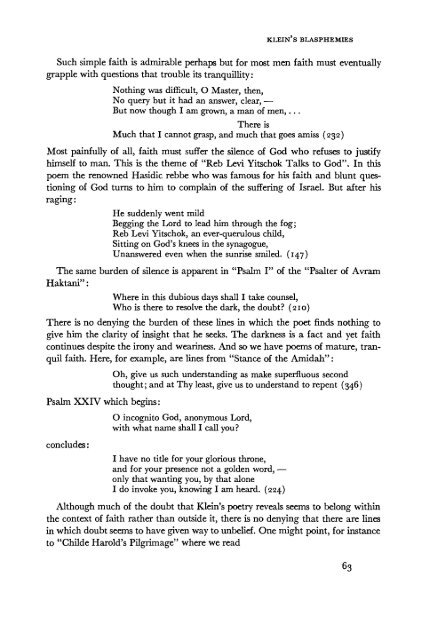THE BLASPHEMIES OF A. M. KLEIN
THE BLASPHEMIES OF A. M. KLEIN
THE BLASPHEMIES OF A. M. KLEIN
Create successful ePaper yourself
Turn your PDF publications into a flip-book with our unique Google optimized e-Paper software.
<strong>KLEIN</strong> S <strong>BLASPHEMIES</strong><br />
Such simple faith is admirable perhaps but for most men faith must eventually<br />
grapple with questions that trouble its tranquillity:<br />
Nothing was difficult, О Master, then,<br />
No query but it had an answer, clear, —<br />
But now though I am grown, a man of men,...<br />
There is<br />
Much that I cannot grasp, and much that goes amiss (232)<br />
Most painfully of all, faith must suffer the silence of God who refuses to justify<br />
himself to man. This is the theme of "Reb Levi Yitschok Talks to God". In this<br />
poem the renowned Hasidic rebbe who was famous for his faith and blunt questioning<br />
of God turns to him to complain of the suffering of Israel. But after his<br />
raging:<br />
He suddenly went mild<br />
Begging the Lord to lead him through the fog;<br />
Reb Levi Yitschok, an ever-querulous child,<br />
Sitting on God's knees in the synagogue,<br />
Unanswered even when the sunrise smiled. (147)<br />
The same burden of silence is apparent in "Psalm I" of the "Psalter of Avram<br />
Haktani":<br />
Where in this dubious days shall I take counsel,<br />
Who is there to resolve the dark, the doubt? (210)<br />
There is no denying the burden of these lines in which the poet finds nothing to<br />
give him the clarity of insight that he seeks. The darkness is a fact and yet faith<br />
continues despite the irony and weariness. And so we have poems of mature, tranquil<br />
faith. Here, for example, are lines from "Stance of the Amidah" :<br />
Psalm XXIV which begins:<br />
Oh, give us such understanding as make superfluous second<br />
thought; and at Thy least, give us to understand to repent (346)<br />
О incognito God, anonymous Lord,<br />
with what name shall I call you?<br />
concludes :<br />
I have no title for your glorious throne,<br />
and for your presence not a golden word, —<br />
only that wanting you, by that alone<br />
I do invoke you, knowing I am heard. (224)<br />
Although much of the doubt that Klein's poetry reveals seems to belong within<br />
the context of faith rather than outside it, there is no denying that there are lines<br />
in which doubt seems to have given way to unbelief. One might point, for instance<br />
to "Childe Harold's Pilgrimage" where we read<br />
63

















